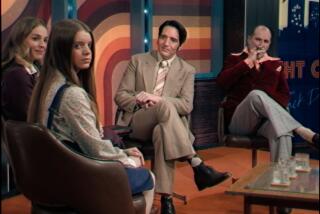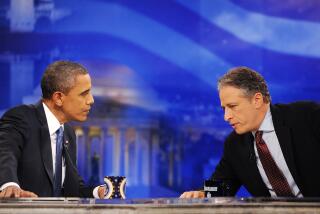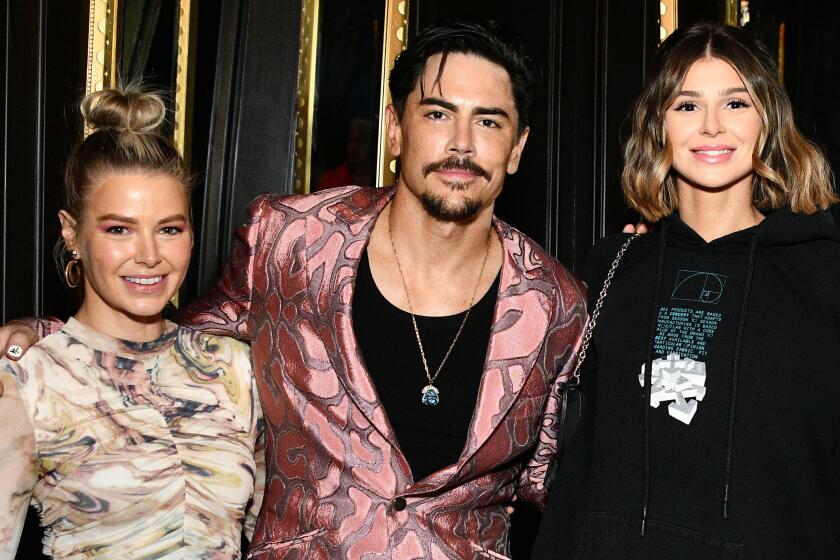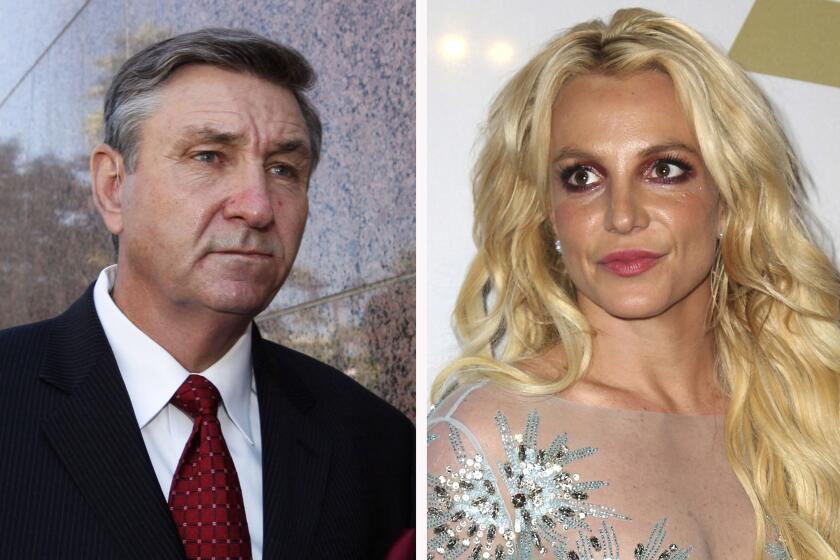‘Johnny Carson: King of Late Night’ takes an in-depth look
Barbara Walters, Peter Jennings and Diane Sawyer all made their best pitch but were turned down. Johnny Carson, the man who changed forever the world of late-night talk, wasn’t talking.
The network news powerhouses had separately attempted to secure interviews with Carson to get him to speak about his life and his place as one of the most influential figures in TV history. But from his 1992 retirement after 30 years on”The Tonight Show”until his death in 2005 at age 79, Carson steadfastly refused to cooperate with almost all interviews, books or films that would have called on him to reflect on his past or his show, which simultaneously reflected and influenced the nation’s conversation about itself. Despite his immense popularity and connection to his audience, he maintained a cloak of impenetrability, aided by his tight circle of friends and family members who shielded him.
Meanwhile, Carson was also being pursued by little-known documentary filmmaker Peter Jones, who unfailingly wrote him every year requesting an interview. His pleas were always greeted with a polite but definitive refusal from Carson’s longtime assistant Helen Sanders.
Then came a phone call in 2003. “It was Johnny,” recalled Jones. “He said, ‘Thank you for all the letters … and you write a damn fine letter. I admire your persistence and style. But I’m not going to do anything because I don’t give a ....’ I tried to convince him that a lot of people did care, wanted to know what his thoughts were. He said, ‘I will let the work speak for itself. You may be the one to do something, but I will not cooperate or participate. I’ve said everything I want to say.’”
Still determined after Carson’s death, Jones eventually earned the trust of Carson insiders. His painstaking commitment to getting to the core of the Carson mystique has resulted in “Johnny Carson: King of Late Night,” an engrossing PBS “American Masters” documentary that airs Monday. In the end, Carson is letting the work speak for itself. Many of the clues into the Carson mystique are provided by comments that the host made on the show during his monologues and interviews.
With the assistance of a database, Jones, along with fellow producers Mark Catalena and Brian Tessier, combed for two years through “Tonight Show” episodes dating to 1962 with the idea of finding remarks from Carson and others that would shed light on his elusive personality. “Our theme was to define and give details about himself through what he said on the show,” said Jones, whose documentaries include PBS’ “Inventing L.A: The Chandlers and Their Times.” “This was important to show this guy who was the most famous man in America but who almost nobody knew.” Watch “Carson’s Cellar” on PBS. See more from American Masters.
The nearly two-hour film contains not only familiar sketches, chummy interactions with sidekick Ed McMahon and moments with show business legends such as Frank Sinatra, Dean Martin and Raquel Welch but also includes a multitude of “Tonight Show” clips that have not been seen since their initial broadcast. The project showcases Carson’s star power, which rivaled most of the Hollywood celebrities sitting on “The Tonight Show” couch.
Supplementing the clips are insights from some of Carson’s friends and popular guests, including David Letterman, Jerry Seinfeld, Don Rickles, Ray Romano, Ellen DeGeneres and Dick Cavett, who explain the host’s uncanny connection to the cultural zeitgeist and the viewing audience.
What emerges is a complex examination of how a shy and awkward fledgling magician from Nebraska born John William Carson eventually created the “Johnny Carson” character who was comfortable, charismatic and in control in front of the camera. He turned NBC’s “The Tonight Show” into a phenomenon — in the 1970s, the show accounted for nearly a fifth of the network’s total profit from advertising revenue.
However, his power and command onstage were offset by a host of private traumas and emotional upheavals. He was married four times and was known to be unfaithful. He had distant relationships with his three sons, who felt detached from their famous father. His mother, whom he adored, gave him little support or reassurance even when he was at the height of his success, and that absence of motherly affection hurt him deeply. He admitted that he could become quite nasty after a few drinks. Away from the camera, he was uncomfortable around people and was characterized in a 1969 biography as being a ruthless and cold womanizer who could be mean to his wives and petty in dealing with his business associates.
“This is ‘Here’s Johnny — warts and all,’” said Jones. “But he still emerges as a wonderful human being. He deeply regretted his failed marriages and his lack of attention to his three sons.”
The key to the documentary was Jones’ bond with the Carson inner circle, particularly Jeff Sotzing, Carson’s nephew and the primary caretaker of the Carson legacy. Carson acquired ownership of “The Tonight Show” in 1980 after a protracted contract negotiation with NBC, and Sotzing oversees the rights for all existing “The Tonight Show” episodes dating to 1962. Those shows, which have been compiled into box sets that fans can purchase, constitute more than 4,000 tapes housed underground in a Hutchinson, Kan., salt mine.
Sotzing offered Jones access to those tapes as well as Carson’s extensive archives and home movies. Sotzing explained, “I hope people who watch this will see how good Johnny was, and how difficult it is to do something like this for such a long time.”
The desire to preserve Carson’s legacy was the turning point that finally persuaded those close to him to pull back the veil, said Jones. “Jeff had his doubts and his reservations — it was like Johnny was sitting on his shoulder. But what finally won him over was the feeling that we don’t want anyone to forget who Johnny was and what he represented.”
Those who knew him
At a premiere of the documentary two weeks ago at the Paley Center for Media in Beverly Hills, Carson’s second wife, Joanne, and his widow, Alexis Carson, mixed with “Tonight Show” veteran guests such as Carl Reiner and Drew Carey, sharing memories. Peter Lassally, the show’s executive producer under Carson, said that he had a 23-year business relationship with Carson but that they had almost no personal connection until after Carson retired. “He was a different person,” he told the audience. “He didn’t have that burden anymore, there wasn’t that shyness or coldness. It was a completely different Johnny.”
“Tonight Show” bandleader “Doc” Severinsen became emotional during the premiere. “It does show the warts, but the film is extremely well done and respectful,” he said. “It’s a testament to showing how Johnny was a man of great class. At heart, he was just a guy from the Midwest who might have been just as happy running a hardware store. But he had unbelievable intellect and a sense of humor.”
Associates of Carson said his success could be attributed to his multifaceted approach to the hosting gig. He displayed both elegance — his designer suits were impeccable, and he had his own clothing line — and gleeful silliness in some of his trademark characters such as lascivious “Tea Time Movie” huckster Art Fern, clumsy psychic Carnac the Magnificent and crabby Aunt Blabby. And with work he appeared entirely comfortable — Conan O’Brien in the documentary jokingly suggests that he resents Carson because he lulled him and other talk show hosts into thinking that the job of talk-show host is easy when it is in fact extremely difficult.
Even more significantly, Carson had an uncanny connection with his audience that is unparalleled today — an appearance on “The Tonight Show” and a demonstration of approval from Carson, awarded with hearty laughter or an impromptu chat on the guest coach, was so influential that a fresh young comedian could catapult from obscurity to stardom overnight. Before the advent of cable television or the Web, Carson reigned supreme in late night, attracting a nightly audience of 15 million viewers, and had precious little serious competition, although some shows such as Arsenio Hall’s talk show cut a bit into his audience in later years.
The current late-night war is much more fragmented and far more competitive, starting with the key 11:35 p.m. battle between NBC’s “The Tonight Show With Jay Leno” and CBS’ “Late Show With David Letterman.” “The Tonight Show” averaged 3.8 million viewers per night last month compared with 3.3 million for Letterman. More important, though both hosts have loyal followings, neither has the magic Carson star-making touch.
David Steinberg, a Carson friend and frequent guest on the show, said in an interview, “If you were a comedian, and Johnny liked you, you had a career the next day. That difference between then and now is palpable. He ordained the culture in that way.”
Jones said Carson’s offstage troubles were at the core of his reluctance to open up after he departed “The Tonight Show.” Said Jones, “There were things in his life he regretted, and he was painfully aware that those were areas he didn’t want to explore in an extended interview.”
“I got a sense not of darkness but more of a sad side,” Angie Dickinson, a frequent “Tonight Show” guest whose interactions with Carson were sparked by an apparent sexual chemistry, said in an interview. There seemed to be an underlying tragedy or lack of satisfaction. He was also very enchanting.”
In another interview, Cavett said: “It would be wrong for me to say that I thought his life was a bed of roses. He was socially inept, almost to the point of pain, around other people. If anything, doing ‘The Tonight Show’ was his life-saving escape. He was in command, in the zone. Johnny could do no wrong.”
Still, Joan Rivers, who is featured in the documentary, has already lashed out against it. Rivers got her first big break on “The Tonight Show” and was so adored by Carson that he named her permanent guest host in 1983. But the two publicly fell out in 1986 when Rivers left to do her own late-night show for Fox. For years, she has contended that he refused to speak to her when she called to ask his blessing. The two never spoke again.
In the documentary, Rivers admits that maybe she should have given Carson a heads-up before he got word of her departure. She now disputes how she was charcterized in the documentary.
The most puzzling mystery investigated in the documentary was how Carson did what is nearly impossible for anyone who has ever achieved his level of success — to walk away at age 65 and eschew the adoration and accolades that would have surely come his way if he had ever wanted to return to the spotlight.
Said Steinberg: “He told me at one point, ‘I just don’t have the desire to get out there again.’ That was it. The conversation was over.”
More to Read
The biggest entertainment stories
Get our big stories about Hollywood, film, television, music, arts, culture and more right in your inbox as soon as they publish.
You may occasionally receive promotional content from the Los Angeles Times.







